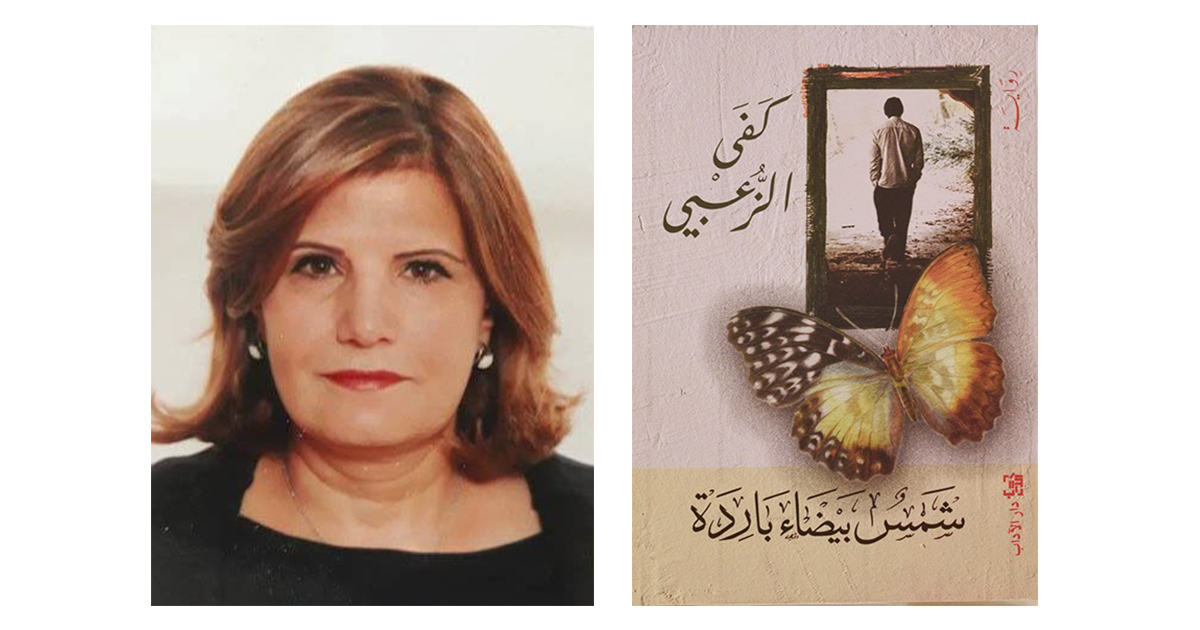Interview with shortlisted author Kafa Al-Zou’bi
11/04/2019

Where were you when the shortlist was announced and what was your reaction?
I was at home in Petersburg, Russia – I live with my family between Amman and Petersburg. At the time of the announcement I stood by the window to keep myself from thinking about it by watching the snow fall heavily outside. A moment later my husband came, extending his hand and smiling, and said “Congratulations.” Moments later, my friend Rana Idris, director of Dar Al-Adab, called me; she was surprised that she was not the first to bring me the news. Of course, I was overjoyed. For me it was another success for the novel after making it to the longlist which gives it an opportunity to reach a wider Arabic audience.
When did you begin writing Cold White Sun and where did the inspiration for it come from?
I began writing the novel in 2014 after meeting a Jordanian young man who spoke to me about his miserable life. He mentioned that he had to rent a room with no windows and that before him an old man died and his body rotted in the room. Immediately, I saw in this information a novel. I did not know yet what story I would have to write about its hero, but I knew it would have intellectual and existential aspects. That room seemed to me to be life itself. Closed up without any horizons, where people live and die and rot. The old man whom the main character will imagine living with him in the room is similar to Enkidu whose body rotted in the Gilgamesh epic because his friend Gilgamesh refused to bury him. Despite the vast difference between the characters of the Gilgamesh epic and the characters of our time today, I saw similarities between them. What was an epic struggle between supernatural powers in open spaces was transformed into oppressed weak characters, defeated and anxious, living in dark, narrow, miserable alleyways, but asking the same questions about existence, immortality, absurdity and nothingness. The novel also reconsiders some of Gilgamesh’s quotes about Enkidu gaining wisdom after having sex. This is humankind: evolving in form but the struggles and questions remain the same. The struggle for survival is accompanied by questioning the purpose of this struggle and this existence, particularly if the existence is in a difficult world that restricts them from every direction and oppresses them with different powers and seeks to impose its vision of the universe on them, through force and persecution.

Did the novel take long to write and where were you when you finished it?
It took me more than two and a half years to write the novel. I write slowly and rewrite and rebuild the characters, events and conflicts until they take the right form and lead to the outcome I want.
I wrote most of the novel in Amman, Jordan. Some of it I wrote in Petersburg, Russia. I live between Amman and Petersburg.
How have readers and critics received it?
Critics received it with great admiration that exceeded my expectations. They praised its structure, symbolism and metaphors, language and proximity to the myth, the absurdity of it and its proximity to the works of Albert Camus, particularly the Sisyphus. The book is present in the novel and accompanies the main character. Many wrote about it, including Lebanese critic Dr. Yomna Al Eid in Al-Quds Al-Araby, and Moroccan writer and critic Mohamed Barrada in Al-Hayat, Jordanian poet and critic Mahdy Nosseir in Jordanian Dostour, Jordanian writer Youssef Damra in the Jordanian magazine Afkar, Jordanian novelist Abdel Salam Saleh in Jordanian Dostour, Palestinian critic Walid Abu Bakr in the Lebanese Al-Akhbar and in Syria many journalists wrote about it in Al-Thawra and Teshreen. The online publication Raseef 22 also wrote about it.
Readers also commended it and expressed their admiration for it. I was invited to some literary salons in Amman to discuss it. Many readers wrote about it on social media. I still constantly receive messages from readers expressing their admiration and that they were very moved by the novel after reading it. When a seminar was held in Amman about the novel, the place was packed.
The novel intersects with The Epic of Gilgamesh and seems to be a rereading of the epic in a more realistic setting. Did you set out to reread and deconstruct Gilgamesh in writing the novel? And are you a fan of Greek mythology?
Of course, I set out to do this and worked on it for a long time. It took me three years to write the novel, during which I wrote many pages which I deleted. I rewrote many scenes over and over to ultimately reach a literary truth in creating and developing a realistic event, as well as in the development and conflict of its characters, so that Gilgamesh does not seem imposed on the text. The story and real events had to intersect with the epic in a convincing and literarily justifiable way.
I see that man has and always will pose the same existential philosophical questions that were posed by Gilgamesh: the question of death and immortality, and absurdity and meaning of life. He does that not to repeat old questions but in search of new answers. This means that he has not yet found convincing answers that relieve him of delusions and rescue him from absurdity. The conflicts that ancient Greek heroes waged against forces thought to be metaphysical and embodied in the gods and demigods continue to exist in their essence today. These metaphysical forces, however, have transformed today into intellectual, political, economic and social forces that are both made by man and yet captivate him.
However, Cold White Sun is not only a re-reading of the epic and an adaptation of its mythical creatures into realistic, desperate and persecuted characters that belong to our world today. It also sometimes contests and reconsiders some of the epic’s sayings such as the main character, Rai’s story with mentally challenged Aisha which is similar to that of Enkidu and Shamhat.
Generally, I find Greek mythology to be fascinating literature that reflected the vision of mankind of life and the universe in ancient times. It was the primary means for knowledge through which man tried to pose his intellectual, philosophical and existential questions. But I was always particularly keen on the Eastern Babylonian Gilgamesh and Sisyphus given their in-depth tackling of existential questions and the absurd. Also, because of the amazing aesthetic of this literary form.
The novel’s title Cold White Sun is quite contradictory. How did it come about?
The title took a lot of time which delayed the publication of the novel. At the beginning, the working title was “Diaries in a Windowless Room” which was an allegory for a closed-up life. But deep down I was not happy with it. That’s why once the novel was in publication I began to search for a new title; one that is not so direct, more metaphorical and also aesthetic. Then as I re-read the novel I suddenly saw it in the text: it came up twice in the main character’s thoughts in the moments where his sense of absurdity heightened. He does not see the sun as it is: yellow and warm, rising every day and forming an everlasting source of life. But rather, white and cold, the inevitability of death and nothingness, since he sees no other fate awaiting him. That title reflected the existing contradiction between “eternal” – or at least long-term life when the yellow warm sun is shining and the individual’s life where the sun shines but quickly grows cold and white.
The novel is divided into days and nights rather than chapters. Why did you choose this structure?
The structure stems from the novel’s content. When I began writing it, the issue of form did not trouble me, as I do not normally seek to use a new literary structure or form. What mattered to me most was the story itself, the condition of literary truth that is linked to the context and development of events, as well as the development of the conflict and of the characters.
At the beginning I wrote this novel in a continuous narration divided into two chapters. But then I noticed that this form did not fit. It did not respond to the main character’s development nor did it reflect his repetitive suffering or symbolize life as the days and nights lived by mankind and lived by the main character specifically in his windowless room. That is why I did away with the first form and rebuilt the novel dividing it into days and nights. The form was born of the story. It was the story that chose the form not me. I am convinced that each story determines its appropriate form and imposes it at a certain point on the writer. It is as if there is an internal law that governs texts, and that is free from the writer. This law dictates that the final form of the work should reflect the meaning of the work
What is your next project after this novel?
A new novel. I began writing it a year ago and I will finish it soon. I also intend to adapt a text to the theatre. My plans also include a critical research project on the novel, which was originally a long article I previously wrote about the philosophical question of the novel and I plan to update it.
